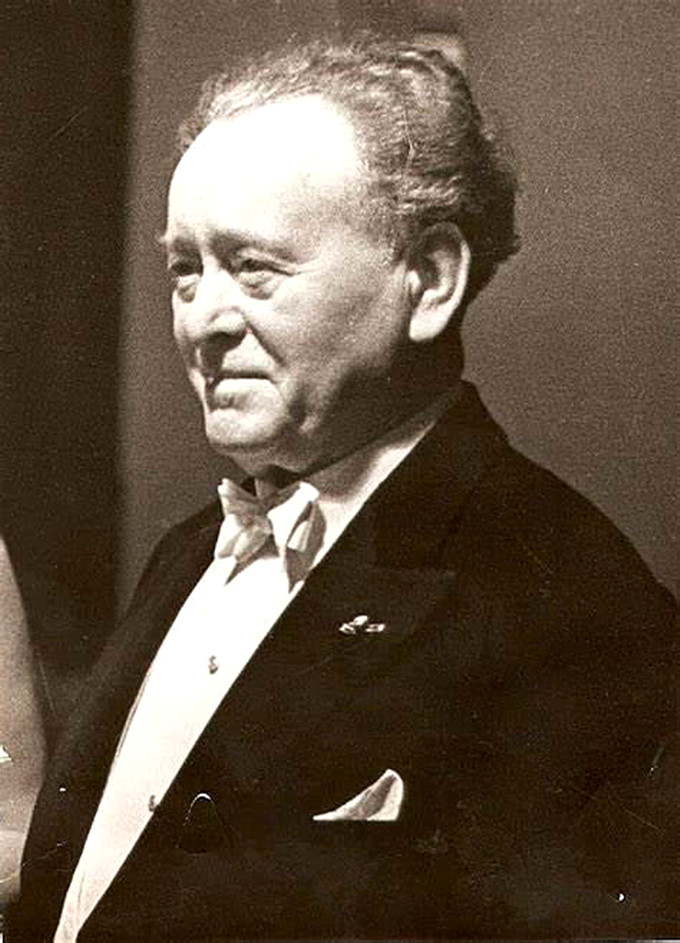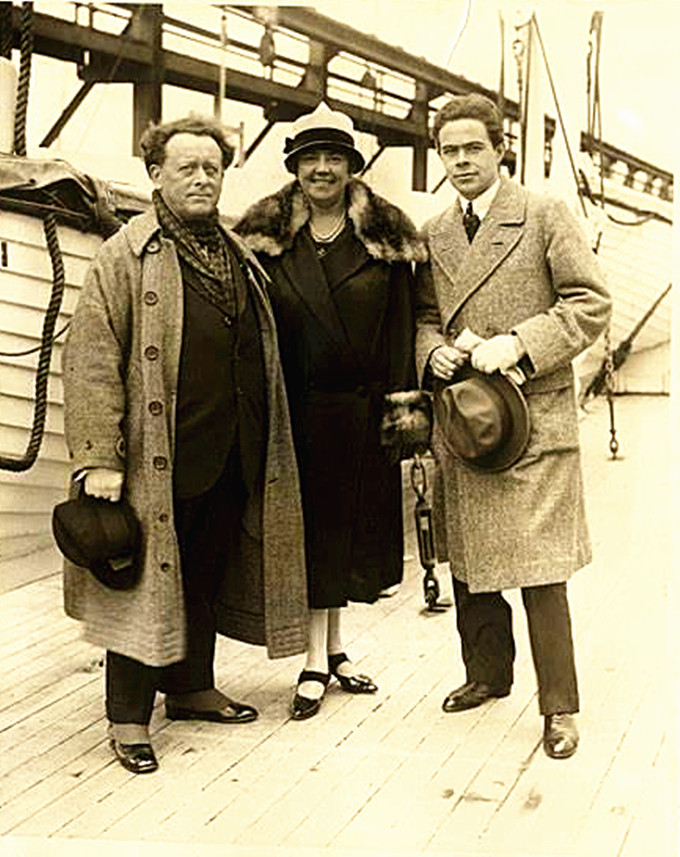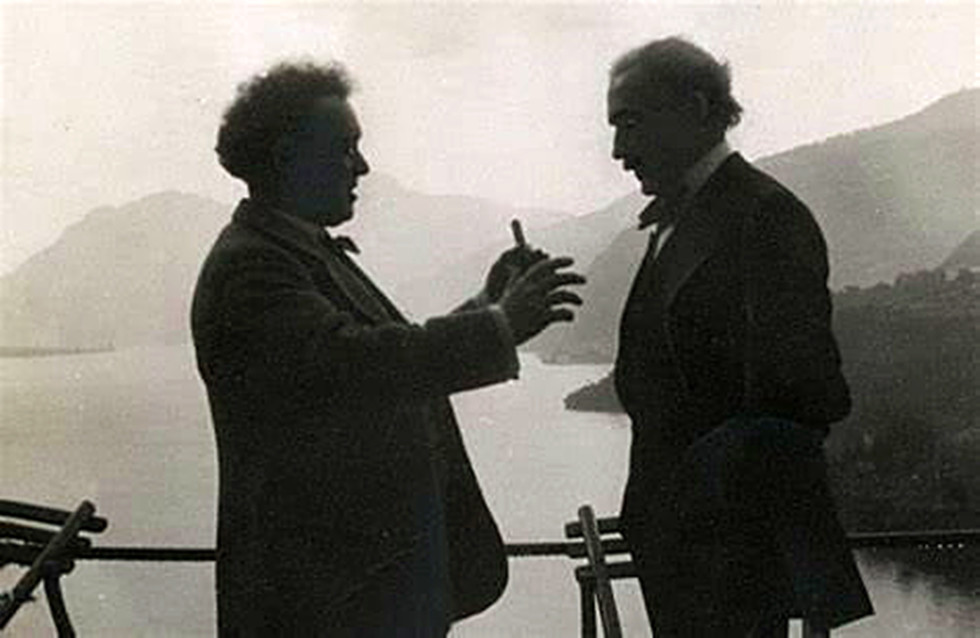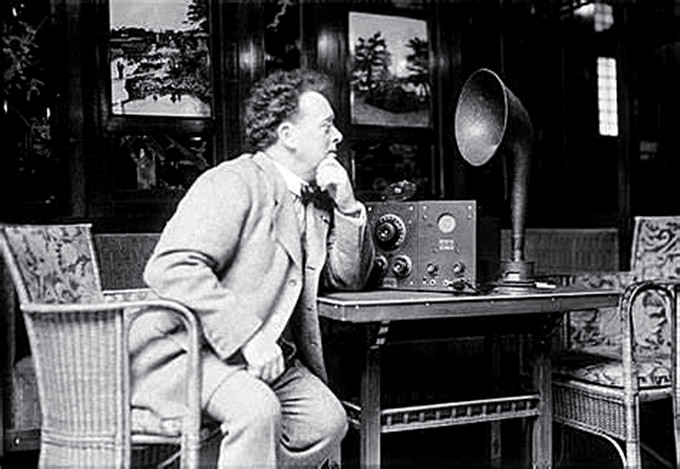| |
|
|
|
|
|
|
|
|
|
|
| |
| |
 |
|
| |
田润德
编译
文/图 2020-03-22 19:36 |
|
| |
|
|
|
|
| |
 |
|
|
|
| |
威廉·门盖尔贝格(Willem Mengelberg
) |
|
|
|
| |
|
|
|
|
| |
门盖尔贝格指挥柴可夫斯基第五交响曲1943,布达佩斯
|
|
|
|
| |
Willem Mengelberg conducts
P.I. Tchaikovsky Symphony No.5 I.1943, Budapest |
|
|
|
| |
|
|
|
|
| |
音乐历史上的今天
1950年3月22日,80岁的指挥家门盖尔贝格(Willem Mengelberg
)死于瑞士,他曾任阿姆斯特丹音乐厅管弦乐团指挥达半个世纪之久,但由于在二战期间同纳粹侵略者进行文化合作,他被终身禁止涉足荷兰音乐界。
门盖尔贝格(Willem Mengelberg
),生于1871年3月28日,生于荷兰乌得勒支。他是一位富有浪漫主义传统的交响乐指挥,在他为阿姆斯特丹格布管弦乐团(Amsterdam
Concertgebouw Orchestra, 1895-1945年)工作期间,将其发展成为世界上最好的管弦乐队之一。
虽然托斯卡尼尼对后世的影响超过其他任何人,但这并不意味着他在同时代指挥身上也留下了烙印。他们的风格大多沿袭十九世纪的传统,已经成了型。当你回望托斯卡尼尼的巅峰时代也就是二十世纪上半叶,那真是黄金年代,遍地都是好机会,这种日子再也不会有了。尼基什、穆克和马勒当时都很活跃。除了托斯卡尼尼之外,还有一批大名鼎鼎的指挥家,比如魏因加特纳、瓦尔特、富特文格勒、比彻姆、斯托科夫斯基、莱纳、安塞梅、克莱伯、蒙特、克伦佩勒、库塞维茨基、奥曼迪、塞尔。
这里面有些人是托斯卡尼尼的对立面。其中三位重要指挥家——门盖尔贝格、富特文格勒和瓦尔特是公认的浪漫派,他们代表的是浪漫主义而非现代传统。这三位中,门盖尔贝格是最伟大的技巧派,好比指挥中的霍洛维茨,有着无限的情感和活力。他矮小、圆胖,常常被称为乐队中的拿破仑。考虑到门盖尔贝格对于音乐的随性理念以及不断修改乐谱的习惯,那么当你听说对他影响最大的人是马勒也就不足为怪了,他们1902年见过面。门盖尔贝格对BBC交响乐团声称他是彻彻底底的马勒派,英国中提琴手、作家萧伯纳引用过这段话:
贝多芬同许多作曲家一样,会修改自己的乐谱,哪怕是在出版之后,接着他就聋了。所以为什么指挥不能改乐谱呢?我们经常比作曲家懂得更多呀。我是席德勒最好的学生,他是贝多芬最好的学生,所以我知道贝多芬的意思。(门盖尔贝格是在跟乐团开玩笑。他说的“席德勒”是辛德勒,1864年去世,而门盖尔贝格出生于1871年。)这是施特劳斯的作品,我从小就跟理查·施特劳斯是好朋友,所以我知道他想说什么,所以我们也来改一改吧!
我们并不应该对门盖尔贝格的这种态度批评得太过严厉,至少不应该比批评瓦格纳、马勒更严厉,或者说所有后浪漫主义时代的音乐家。哪怕到了门盖尔贝格的时代,由演奏家来帮助缺乏暴烈感的作曲家也是常有的事。当布索尼因为重写了弗朗克的《前奏、赞美诗和赋格》的部分而遭人诟病时,他只是简单而合理地回答说,弗朗克并不总知道怎么写才能达到自己想要的效果。哪怕冒着无聊乏味的危险,我也要不停地重复一点:对乐谱的忠诚是一项近代发明;我们不应该谴责一位十九世纪的音乐家跟随自己时代的潮流,正如我们不应责怪早期意大利艺术家不知道透视法。
门盖尔贝格在德国接受音乐训练,在卢塞恩指挥了五年,1895年回到祖国荷兰,担任阿姆斯特丹音乐厅管弦乐团的总监。他将一个小地方乐队发展成了交响世界的顶尖名团。他指挥该团长达四十一年之久,直到1941年。在二战中,门盖尔贝格与纳粹政府合作,1945年荷兰名誉委员会禁止他继续参与任何音乐活动。他用艺术为自己辩解。“我的艺术是一种公共财产,不应该剥夺任何人享受它的权利。我对政治没有兴趣。”但事实无法磨灭,1941年他在德国文化内阁中担任了职务,二战中一直在德国指挥。
他是一位有着超群技巧和驱动力的指挥,对马勒和施特劳斯那种音响宏大、曲谱复杂的音乐尤其着迷。施特劳斯将《英雄生涯》(Ein
Heldenleben)题献给他,大家公认没有一位指挥能够演释出那种兴奋、辉煌和戏剧效果。门盖尔贝格留下了一张唱片,让世人皆成见证。作为一位风格大师,他属于瓦格纳派。作为一位真正的浪漫主义者,他会在对比段落放慢速度,使用自由速度,不给人留什么想象空间。直到1930年代,他还让弦乐部在《第九交响曲》的慢板部分使用滑音来加强情感效果。这种过时的效果,以及他的节奏变化,令许多音乐家和评论家不满;然而他的戏剧感和巨型油画效果又让观众如痴如狂。正如劳伦斯·吉尔曼(Lawrence
Gilman)所言:“他的过错叫人生气,但他的美德也很高贵。”
门盖尔贝格在美国相当活跃,1905年之后时常亮相。1919年波士顿交响乐团与他接洽,希望他接任穆克的职位。
最后因为钱没谈拢。“在我印象中,美国一直是个很有钱的国家,”他对一个记者说,“但是从我的聘金来看,似乎并非如此。”后来他指挥纽约爱乐乐团,1927-1928年与托斯卡尼尼共事。一山不容二虎,门盖尔贝格成了输家。温索普·萨金特(Winthrop
Sargeant)说门盖尔贝格将乐团调教得很完美,然而托斯卡尼尼不这么认为,他开始重塑乐团,抛弃了所有门盖尔贝格珍视的理念。托斯卡尼尼对待错误的方式(萨金特语)不是理性的解释而是暴怒,他发怒的时候用指挥棒敲谱架敲到断。门盖尔贝格代表了“有原则和传统的人,为音乐的道德体制而奋斗,他相信体制比自我更伟大。而另一方面,是一位无情而专制的天才,横扫面前一切,要求大家屈从于完全凭一己直觉制定的标准,而非规则和秩序”。乐队的乐手们都知道谁会成为胜利者,可怜的门盖尔贝格的排练变成了一片混乱。门盖尔贝格相信自己的枪,却失去了力量和权威。他本来想坚持到底,忍受了几个音乐季的虐待,但最后还是回了家,再也没回来。
门盖尔贝格还有一个特点:在史上所有指挥家中,他是最有强迫症的话痨。卡尔·弗莱什(Carl Flesch)
一次在排练时看表记了时。大指挥说了一个半小时,然后只排练了三刻钟。萧伯纳描述了第一次为门盖尔贝格排练的情形,当时他已经退休。门盖尔贝格出现,然后开始回忆他在全球各地指挥各大乐团的美好经历。“你们看,没有什么我不知道的。那么双簧管先生,现在给我个A。”然后乐队花了二十五分钟调音,直到指挥满意。这真是彻底的仪式。先是小提琴跟着双簧管调A,然后是整个弦乐声部依次调音,然后是整个乐队各声部依次调音,最后是大管。等到整个乐队找到了A,小提琴再开始调其他几根弦。双簧管像个大主教,必须得“站起身,朝着各声部的方向吹奏,为了让远处的人听到。而门盖尔贝格像尊大佛坐在指挥台上,逐个批评最细小的走音。”终于,乐团把调音时间缩短到了五六分钟。(一些指挥对调音特别敏感。亨利·伍德爵士在执掌早期的女王音乐厅乐队时,特制了一座调音器,用风箱吹一块簧片,保持在华氏59度每秒振动435.5次的频率。他要求每个乐手在后台都得在这台机器旁边登记调音。)
门盖尔贝格的声名在去世后很快烟消云散,这种情况经常发生在技巧大师身上。门盖尔贝格生不逢时,他的两大遗产——技巧和浪漫主义在那个时代都不被看好。后世对他不甚公平,他应该得到更多。他的音乐用现在的标准衡量也许过于造作,但一直充满着生命力、动力和一种信念。至今无人能超越他的音乐色彩,哪怕库塞维茨基和斯托科夫斯基也没能做到。这个矮小的人有一种真实的力量,他是一位伟大的个人,也是乐队最可靠的主人之一。
今日视频:1、门盖尔贝格指挥柴可夫斯基第五交响曲1943,布达佩斯;2、门盖尔贝格指挥阿姆斯特丹管弦乐团
珍贵音乐会录像(1931年录制)。 |
|
|
|
| |
 |
|
|
|
| |
门盖尔贝格(Willem Mengelberg )在旅行演出的途中 |
|
|
|
| |
 |
|
| |
门盖尔贝格和托斯卡尼尼 |
|
|
|
| |
Today in
the history of music
On March 22, 1950, the 80-year-old conductor Willem Mengelberg,
who had conducted the orchestra at the Amsterdam concert hall
for half a century but was banned from Dutch music for life for
his cultural cooperation with Nazi invaders during world war ii,
died in Switzerland.
Willem Mengelberg was born on March 28, 1871, in Utrecht, the
Netherlands.A symphony conductor in a romantic tradition, he
developed the Amsterdam Concertgebouw Orchestra (1895-1945) into
one of the best orchestras in the world.
Although toscanini had more influence on later generations than
anyone else, this does not mean that he also left a mark on
contemporary conductors.Most of their styles follow the
traditions of the 19th century and have been shaped.When you
look back at the peak of tuscanini in the first half of the 20th
century, it was a golden age, a time of great opportunity, a
time that will never happen again.Nikesh, muk and mahler were
all very active.In addition to toscanini, there were a number of
well-known conductors, such as weingartner, walter, futwangler,
beauchum, stokowski, reiner, anseme, kleber, monte, klempeller,
kucevitsky, ormandy, sell.
Some of these people are the antithesis of toscanini.Three of
the leading conductors, mengelberg, futwangler and walter, were
known as romantics, who represented romanticism rather than the
modern tradition.Of the three, mengelberg was the greatest of
the technical types, like horowitz in command, with boundless
emotion and energy.He was short and round and often called the
napoleon of the band.Given his casual approach to music and his
habit of revising scores, it is not surprising to hear that the
person who influenced him most was mahler, whom he met in
1902.Mengelberg told the BBC symphony orchestra that he was a
complete and utter mahler. British viola player and writer
George Bernard shaw quoted him as saying:
Beethoven, like many composers, would revise his scores, even
after publication, and then he went deaf.So why can't the
conductor change the score?We often know more than composers.I
was sidler's best student, he was Beethoven's best student, so I
knew what Beethoven meant.(mengelberg was joking with the
band.By "sidler," he meant schindler, who died in 1864, and
mengelberg, who was born in 1871.)This is by strauss. I've been
friends with Richard strauss since I was a kid, so I know what
he's trying to say, so let's change it.
We should not be too critical of this attitude on the part of
mengelberg, at least not more so than we are of Wagner, mahler,
or any other post-romantic musician.Even in the days of
mengelberg, it was common for performers to help composers who
lacked a sense of violence.When boussoni was criticized for
rewriting parts of frank's prelude, hymn, and fugue, he simply
and reasonably replied that frank didn't always know how to
write it to get the effect he wanted.At the risk of being bored,
I repeat that fidelity to music is a recent invention;We should
not condemn a nineteenth century musician for following the
fashion of his time, any more than we should condemn the early
Italian artists for not knowing perspective.
Trained in Germany, he conducted in lucerne for five years
before returning to his native Holland in 1895 to become
director of the orchestra of the Amsterdam concert hall.He
developed a small local band into one of the best in the
symphonic world.He commanded the regiment for forty-one years
until 1941.During world war ii, mengelberg collaborated with the
Nazi government, and in 1945 the Dutch reputation board banned
him from continuing any musical activities.He defended himself
with art."My art is a public property and should not deprive
anyone of the right to enjoy it.I'm not interested in
politics."In 1941 he took up a post in the German cultural
cabinet and commanded in Germany throughout the second world
war.
He was a conductor of exceptional skill and drive, particularly
fascinated by the large, complex music of mahler and
strauss.Strauss dedicated Ein Heldenleben to him, and it is
generally accepted that no conductor can deliver such
excitement, brilliance, and drama.Mengelberg left behind a
record for the world to witness.As a master of style, he
belonged to the Wagnerian school.As a true romantic, he would
slow down in comparison passages, using free speed, leaving
little room for imagination.As late as the 1930s, he had the
strings use slippage in the adagio section of the ninth symphony
to enhance the emotional effect.This anachronistic effect, and
his change of pace, displeased many musicians and
critics;However, his sense of drama and the effect of giant oil
painting made the audience crazy.As Lawrence Gilman put it: "his
faults are irritating, but his virtues are noble."
Mengelberg was active in the United States, appearing frequently
after 1905.In 1919 he was approached by the Boston symphony
orchestra to succeed mook.Finally because the money did not
agree."In my mind, the United States has always been a very rich
country," he told a reporter. "but from my endowment, it doesn't
seem that way."He later conducted the New York Philharmonic,
working with toscanini from 1927 to 1928.One mountain does not
make two tigers, and mengelberg is the loser.Winthrop Sargeant
said Mr. Mencelberg taught the orchestra perfectly, but Mr.
Toscanini didn't think so, and he began to reinvent the
orchestra, discarding all of Mr. Mencelberg's cherished
ideas.Toscanini's way of dealing with errors (sargent) is not a
rational explanation but a rage, in which he breaks the musical
frame with his baton.Mengelberg represents "a man of principle
and tradition, fighting for a moral system of music that he
believes is greater than himself.On the other hand, a ruthless
and autocratic genius sweeps everything in front of him,
demanding obedience to standards set purely by instinct, rather
than to rules and order.The band's musicians knew who would be
the winner, and poor mengelberg's rehearsals turned into a
mess.Mengelberg believed in his gun, but he lost his power and
authority.He wanted to stick it out, endured some musical season
abuse, but eventually returned home, never to return.
Mengelberg also had the distinction of being the most obsessive
talker of all conductors in history.Carl Flesch once looked at
his watch during a rehearsal.The conductor spoke for an hour and
a half, then rehearsed for only three-quarters of an
hour.Bernard shaw described the first rehearsal for mengelberg,
after he had retired.Mengelberg appeared and began to recall his
wonderful experiences conducting orchestras around the
world."There's nothing I don't know, you see.Now, Mr. Oboe, give
me an A."Then the band spent twenty-five minutes tuning up until
the conductor was satisfied.It was a thorough ceremony.First the
violin is tuned to the oboe, then the whole string part, then
the whole orchestra, then the bassoon.When the band found A, the
violin began to tune the other strings.The oboe, like an
archbishop, must "stand up and play in the direction of the
parts in order to be heard at a distance.And mengelberg sits on
the podium like a giant Buddha, criticizing the smallest steps
one by one."Eventually, the orchestra reduced the tuning time to
five or six minutes.Some conductors are especially sensitive to
tuning.When Sir Henry wood was in charge of the early queen's
hall band, he built a special tuner that blew a reed with a
bellows to keep it vibrating 435.5 times a second at 59 degrees
Fahrenheit.He required every musician to register for tuning at
the machine backstage.
As is often the case with masters of technique, Mr. Mencelberg's
reputation dissipated quickly after his death.Mengelberg was
born at a time when his two great legacies, technique and
romanticism, were viewed with suspicion.Posterity has not been
fair to him, and he deserves more.His music may be too
artificial by today's standards, but it has always been full of
vitality, drive and a sense of faith.No one has ever surpassed
his musical touch, not even kucevitsky and stokowski.There was a
real power to this little man, a great individual and one of the
band's most reliable owners.
1. Mengelberg conducts Tchaikovsky's fifth symphony, 1943,
Budapest;2. Video of mengelberg conducting a rare concert with
the orchestra of Amsterdam (recorded in 1931). |
|
|
|
| |
 |
|
|
|
| |
门盖尔贝格 |
|
|
|
| |
|
|
|
|
| |
门盖尔贝格指挥阿姆斯特丹管弦乐团 珍贵音乐会录像(1931年录制)
|
|
|
|
| |
门盖尔贝格和阿姆斯特丹管弦乐团合作的珍贵音乐会录像,1931年录制柏辽兹拉科奇进行曲等
|
|
|
|
| |
Willem Mengelberg & Concertgebouw
Orchestra (1931 Movie) |
|
|
|
| |
|
|
|
|
| |
未得原作者编者授权严禁转载www.mt77.com任何内容 |
|
|
|
|
|
|
|
|
|
|
|
|
|
|


